
The biggest story in television this year was the rise of the streaming services, with Disney+, HBO Max, Apple TV+, and NBCUniversal’s Peacock joining what was already the crowded field of Netflix, Amazon, and Hulu. This followed a monopolistic wave of mergers and consolidations that included: AT&T buying Time Warner with Warner Bros. and HBO; the cable network Comcast buying the NBC network with Universal film studios and becoming principal owner of Sky, the most popular European satellite network; and Disney buying the Fox Production Company and Fox studio and catalogue and becoming principal owner of Hulu.
The point of this activity was to begin moving television (and films) online, a movement that was accelerated by COVID, such that Disney, whose live action theme parks and cruise lines are floundering, has in one year reached 86 million subscribers, a figure it was predicted would take four years to accomplish. Netflix is nearing 200 million subscribers worldwide with the majority now outside the U.S. and with 25 million new subscribers during the first phase of the pandemic. Disney+, Amazon Prime and Netflix are forecast to control half of the world’s streaming video subscriptions in the next five years.
This is a movement that defrays costs especially as it circulates the globe. Thus, publicity costs for the 21 Warner Bros. films that will be released online as well as in theaters next year do double duty as trumpeting the film in the theater and as providing subscribers online. Complex overseas licensing agreements are short-circuited as all profits now accrue to the distributing company. These companies once they become global also undercut local production, most often of nationalized television networks and stations whose major artists then clamor to sign with the streaming services which guarantee global distribution. Rights, following the Netflix model of artists only being paid upfront, could revert to the streaming service in perpetuity, which then uses the series or film to stock its back catalogue and gain future subscribers without paying royalties.
The streaming services are also part of a generalized trend toward life moving online and away from forms of neighborhood and local collectivity. Movie theater chains in the U.S. have closed this year and gone bankrupt as the major studios experiment with online distribution. Malls and small shops across the western world are empty and deserted as Amazon, now promising one-day delivery, becomes the world’s shopkeeper and Amazon warehouses replace stores as whole city blocks flounder. The movement to 5G and its faster download speeds hastens the move from television as family centerpiece to individualized cell phone viewing, turning the physical shared space of the household into individualized spaces with each member in their own world.
These new largely digital and communication conglomerates also have their own agenda with television and film seen as a sideline or shill for the main industry. Almost two-thirds of AT&T/Time Warner’s profits come from the parent company’s cell phone sales, and Warners now must accommodate to friendly cell phone viewing fare. The aggressive takeover prompted the HBO president, after being told the prestigious company needed to be more popular and make more money, to quickly resign. There may be some desertion of what might be a sinking ship as agitated creators, seeing their profits diminished as films open online, have begun referring to the company as Former Bros., and with the mother company, as are all these conglomerates, 170 billion in debt. Amazon Prime video must work in concert with the delivery of Amazon products: It was recently revealed that Apple TV+ had quashed a series which was laudatory about a defunct gossip app Gawker which had revealed company secrets.
Last year the U.S. produced 532 series, a number sure to be exceeded in 2021 as Disney, for example, goes full tilt into series production with no less than nine new Star Wars series in a repeat of the television network habit of saturating the market with copies after every hit series, in this case with the success of The Mandalorian. A point that bears emphasis is that 532 and climbing is just a drop in the bucket of global series, which last year numbered 10,600. In attempting to compete with this movement online, national television networks everywhere are joining forces with independent networks in their own countries or regions to form their own streaming services, most prominently in the UK with Britbox, in France with Salto, and in the Scandinavian countries with the already widely popular Viaplay.
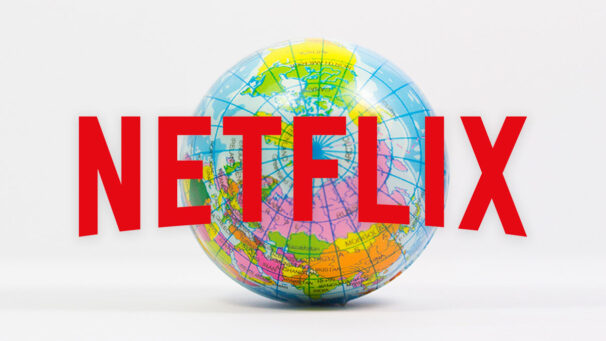
The American streaming services are also accumulating untaxed wealth as they circulate the globe. Next year will be part of a global effort to tax American digital companies, following this year’s European Parliament attempt to make online services more accountable for their content and to curtail monopolistic and non-competitive practices.
With the streaming services this year, there is a renewed emphasis on original production since it is becoming clear that new series are what drive subscriptions as HBO Max, which has ventured few series, has badly lagged in subscribers. The series on offer have attained a level of sophistication above what used to be network fare, but which has stagnated. HBO Max’s first new entry, The Flight Attendant, is a star turn for Big Bang Theory’s Kaley Cuoco and an advert for HBO Now after the service bought back the rights to her former show Big Bang, one of the most popular of steaming series on Netflix. The Flight Attendant is a fast-moving comedy-thriller that deals with addiction and childhood abuse, but in a superficial way that leaves untouched any deeper sociological implications about abuse, addiction and the deteriorating American family structure due to increased joblessness.
Top 20 + 10 (+ bonus 5 worst)
I watched 140 series this year and was able to cull a Top 30 which, with some categories combined, is really 35. Thus, one-fourth of the series I watched were praiseworthy, a high number. But that does not count approximately 400 series I monitored and then passed on because too derivative of other earlier, better series and films or whose subject matter and treatment promised only socially irrelevant diversion, and not particularly well executed diversion at that. This mediocrity will accelerate in 2021 with the entry of more money into the conglomerate streaming race.
This year’s Top 30, from 12 countries, also expands the notion of series, including: one retro anthology series that today looks more prescient than ever (Alfred Hitchcock Presents), discoveries of previous series based on this year’s creators (Misha Lovecraft Country Green’s Undercover), and weekly and topical news and commentary series necessary in the age of Trump and Biden (RT’s Redacted Tonight, Seth Meyers and Amber Ruffin on Late Night). Also included is one shining moment of truth telling, Ricky Gervais’s Golden Globes monologue that, because it was so honest, stood out like a sore thumb not only during awards season but for the entire television year.
Here goes:
A Christmas Carol – Steven (Peaky Blinders) Knight’s answer to Christmas drivel like Jingle Jangle. Knight’s imagining of a nearly unrepentant Scrooge as prototype capitalist owner resounded throughout this year of Jeff Bezos profiting from his own Tiny Tims without allowing them bathroom breaks. Knight’s version is a very Peaky and very profound reimagining of Dickens tale, which had lost its bite in too many syrupy retellings.
Home Before Dark – First great series from Apply TV+ about a pre-teen journalist whose truth-telling exposes the embedded masculine power structure in a small town in Washington state. Hilde’s online dispatches bring together an African-American boy and Asian-American girl, a Black female deputy who must question her white male superior, and the pint-sized reporter’s lawyer mother, all to right a past injustice visited on the area’s indigenous Yakama population. Superbly differentiated characters and an exceptional cast highlight the storytelling.
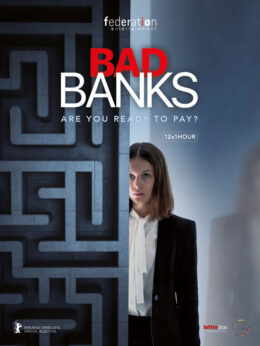
Bad Banks – Fintech, the infiltration of the tech industry by the financial industry, is the subject of season two of this superb German series. Jana’s megabank expands, and she is sent to corrupt a start-up designed in its idealistic phase to aid sustainable development. This interpenetration reminds us of a moment long ago and many galaxies away when Google’s motto was “Don’t do evil”—a moral imperative now become a punchline.
For Life – This series, produced by 50 Cent and based on a true story about a Black prisoner who became a criminal lawyer and defended inmates, was, in the year of Black Lives Matter’s questioning of the criminal justice system, a clear-eyed and penetrating look at how justice in the U.S. and the West is aligned against minority defendants. Aaron Wallace’s struggle against a corrupt prosecutor played out alongside and amplified calls in the street for police injustice to be halted.
Babylon Berlin – Season three found police detective Gereon Rath and his female accomplice Charlotte Ritter drawn ever further into the developing fascist morass that will eventually spell the end of the Weimar Republic. A financier and Nazi sympathizer preaches chaos as the stock market collapses and the army and the police reveal themselves to be centers of a fascist coverup. Amidst this carnage, Gereon and Charlotte are more hard-pressed than ever to defend the fading democracy, and Gereon is introduced to a new book titled Mein Kampf. Couldn’t be more prescient as Proud Boys take to the streets to support Trump’s attempted coup. Perhaps brandishing copies of Art of the Deal, this generation’s fascist manifesto? If the current U.S. street situation isn’t Weimar, it certainly is Weimarish.
The Valhalla Murders – This Icelandic series, now on Netflix, begins as a very clichéd serial killer romp involving the long-ago psychological debris of the violence of a boarding school. Stay with it, though, because the series at its midpoint takes a surprising turn as the effects of the initial exploitation work their way upwards to engulf layers of the criminal justice system. A stunningly effective and vastly underrated series.
Normal People – This BBC and Hulu co-production based on the Sally Rooney novel is an acute examination of not just the triumph, pain and physicality of a first love but also the horrific and persistent ways that class divides people as we watch a working-class boy and an upper-class girl alternately find each other and fall victim to the layers of distrust in themselves and in Irish and capitalist society as a whole.
Money Heist – Seasons three and four on Netflix attempt to disprove the old adage that “you can’t go home again,” or in this case you can’t rob Spain’s national bank after robbing its national mint. The Professor and his team this time are melting down gold in the post-U.S. dollar world where countries are hoarding this precious commodity ahead of a U.S. currency collapse. The season should have concluded the end of the robbery, but the streaming service opted to delay the outcome to peak interest in another season, a move which weakened season four.
Jordskott – This Swedish series brought together various strands from other films and series and wove them into an emerging subgenre, ecological horror. Season one had forests, which cover half the area of the country, under pressure from a logging cabal with a Stockholm detective in search of her long-lost daughter becoming ever more involved in the need to recognize and preserve a verdant nature being destroyed by greed. Season two had her returning to Stockholm but with her connection to the forest nourishing her fight to protect it.
Homecoming/Hightown – The high and low of the drug trade. Season two of Amazon’s Homecoming has Janelle Monáe as supposed victim of a corporate pharmaceutical company that in season one had annihilated veterans and cut loose amnesiac therapist Julia Roberts. Season two’s sole hero is another veteran who doggedly pursues the company’s predatory commercial impulses and ties to the military. Hightown, on the other hand, charts the struggles of a Latina lesbian in drug addled Provincetown as she keeps hitting deeper bottoms but refuses to give up on her quest to become a detective.
Ricky Gervais’ Golden Globes Monologue – Last time for sure the comedian and inspiration behind The Office will be asked back to what is more public relations stunt than acknowledgement of creativity. His mantra, as the monologue crossed the boundary from ribbing to active jabbing and exposing of the hypocrisy of liberal Hollywood, was “I don’t care.” High point was the accusation of a taboo subject in the entertainment world, the sweatshops in Asia that underlay Hollywood wealth. The disapproving look of the town’s current wielder of soppy morality Tom Hanks? Priceless.
Fearless – This 2018 series, pejoratively labeled at the time “for the conspiratorially minded,” has Peaky Blinders’ Helen McCrory as a crusading attorney who uncovers a secret behind Tony Blair’s criminal rush to enlist Britain in the Iraq war against the will of the country. McCrory’s unearthing of the collateral damage of the war on British democracy as Blair blindly followed U.S. Pres. G.W. Bush is worth a second look in light of the upcoming verdict on the U.S. extradition of Julian Assange, with Britain, as it supposedly embarks on its independent course post-Brexit, being asked again to surrender its sovereignty.
Snowpiercer – Last year we got Bong Joon Ho’s Parasite, perhaps the most astute analysis of class tensions and contradictions ever put on the screen. This year we have TNT and Netflix’ series adaptation of his film Snowpiercer, about a class-segregated train that circles a globe frozen because of a failed technological attempt to subvert global warming. Daveed Diggs is stunning and resolute as the revolutionary who carries his struggle for the oppressed backenders to the head of the train. With the reports that five years after the Paris Accords the planet’s temperatures have worsened, Snowpiercer is beginning to resemble not a far-off dystopia but the evening news.
Green Frontier – Colombian series on Netflix that centers on the Euro destruction of the Amazonian rainforest and the attempt by its Indigenous and a female cop from Bogotá to save the forest. While its Swedish compadre Jordskott employs the tropes of horror, Green Frontier summons the Latin American mystical embrace of Magical Realism in its depiction of the timeless quality of the forest’s protectors versus the contemporary assault of loggers, corrupt law officials and a mysterious ex-Nazi linked to the history of European exploitation of the continent.
Biohackers – Netflix series hatched in the wilds of Bavaria that takes us inside the corporate-university world of genetic engineering. The heroine is a young student herself the victim of this biological tampering who enlists her fellow students as part of a do-it-yourself bio-technology movement all to thwart the efforts of their unethical professor who experiments on human tissue, a modern Dr. Mengele in a pantsuit.
Lovecraft Country backed with Underground – The first is a contemporary HBO series that expands the horror, science fiction and fantasy genres, putting African Americans front and center in a successful attempt to shatter the cultural apartheid which surrounds American popular entertainment while also highlighting the literal apartheid of the 1950s in defining the country as a police state patrolling racial boundaries. The second, a former series by the same showrunner Misha Green—the discovery of the year—tracks the “Macon 7” as they escape Southern slavery in season one and as they and their Northern Abolitionist allies become radicalized as they come in contact with John Brown in season two. The antidote to the ludicrous Brown portrayal in Good Lord Bird.
Mystery Road – Aaron Pedersen’s Aboriginal detective who travels the Australian North is in season two in search of the nest of a viperous crystal meth gang growing rich off infecting the Indigenous who are scattered along this road. Pedersen’s stolid and stoic doggedness as he upsets the still-colonial Anglo power structure of the region remains rooted in his connection with his people who continue to cling to their way of life in a region that is now becoming a center of Anglo flight from the continent’s overpopulated cities.
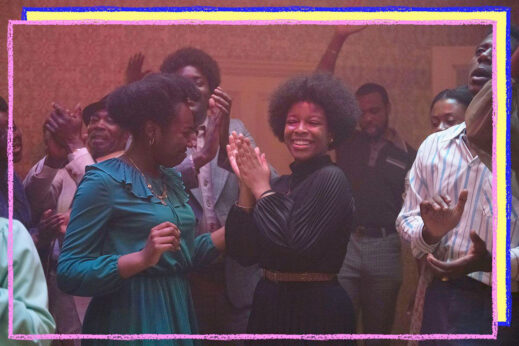
Small Axe – Videographer, artist and filmmaker Steve McQueen’s outrageously ambitious mini-series made up of five episodes that collectively map the progression of Caribbean peoples of the Windrush generation, imported into Britain post-World War II to help rebuild the country but who were discriminated against then and now. A truly Balzacian and Zolaesque project whose equivalent in literature is Walter Mosely’s Easy Rollins novels about Black Los Angeles. The series tracks Caribbean life and culture in a racist Britain in its bars (Mangrove), house parties (Lovers Rock), interaction with the police (Red, White and Blue), in prisons (Alex Wheatie) and schools (Education). Music is crucial to this evolution; the subtlest and slyest episode is the two-hour house party that is Lover’s Rock with its extended takes of women on the dance floor carving out their place in reggae and the crowd going wild over “Kung Fu Fighting.”
Next – In this year of both U.S. and European questioning of the unrestrained power of the technology industry, this series about a master computer gone berserk and waging war on a planet of utterly interconnected devices was a breakthrough into relevance for U.S. network TV. Next summoned the ghost of series past, particularly Fringe, in its warning of how our lives are threatened by our devices and the companies that wield them for profit. Fox, sensing the series was groundbreaking, canceled it after two episodes but will allow the remaining eight episodes to be shown.
Big Sky – David E. Kelly’s correction to his own scurrilous adoration of the rich that was The Undoing. This ABC series brought female agency to the rightfully maligned, male misogynist serial killer genre as, after a shocking resolution in episode one, male energy gives way to cross racial, cross-class female agency.
Ten Honorable Mentions
Seth Meyers Late Night and The Daily Show – As Trumpism gives way to Biden’s New Normal in the midst of a pandemic and an economic collapse, these two series, the cream of the crop of a heightened satirical late-night impulse, couldn’t be more relevant. Seth Meyers’ and Amber Ruffin’s faux trailer for “White Savior,” about Hollywood movies that ignored the African-American role in Black Liberation in favor of a white liberal hero, was NBC must-see TV. The Daily Show’s group of “correspondents”—Desi Lydic’s mocking of Trump-era journalism called “Journalisiming,” Roy Wood Jr.’s knowing deadpans and telling sarcasm, and Jordan Klepper’s “Fingering the Pulse” of Trump lunacy—made this show shine. All clips are available on YouTube.
Alfred Hitchcock Presents – Retro series of the year with Hitch directing three of these brilliant and only slightly veiled critiques of the vacuousness and greed of a 1950s America, celebrated by Trump nostalgists as a Golden Age: Lamb to the Slaughter, Breakdown and Poison, all available on YouTube.
Taken Down – Irish series that illuminates and undercuts the miracle of the Celtic Tiger by viewing it from the vantage point of immigrants, abused and exploited as Irish society becomes consumed in a wanton greed and a need to approximate the lifestyle of Dublin’s elite.
Stargirl – Best of Greg Berlanti and the DC Universe was this under-the-radar revival of the 1940s Justice Society of America as seen through the eyes of a female teen whose superpowers take second place to her bonding with her nerdy but affectionate stepfather. Far more touching and affecting than the polyglot overpopulated superhero extravaganza that was Crisis on Multiple Earths.
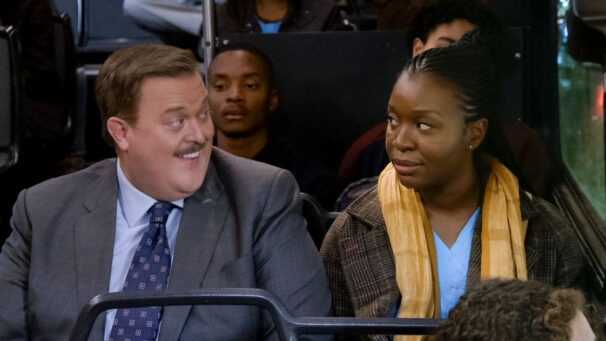
Bob Hearts Abishola – Season two of this Chuck Lorre series, about the later-in-life touching romance of a Detroit Anglo sock merchant and a Nigerian nurse, centers around the tensions involved in Bob and Abishola’s marriage while featuring the cynically hilarious takes of Abishola’s African-American and Nigerian co-workers.
The Mandalorian – Best Star Wars iteration since the original trilogy. This space Western boasted a second season full of surprises but which by season’s end, because of its patterned folding into the mythology of the original, was in danger of losing its own originality.
Jack Irish – Guy Pierce in this Aussie detective series that spotlights the local tavern and racing culture of Melbourne’s Fitzroy district as well as the corporate greed of again a pharmaceutical company experimenting on immigrants. Funniest moment is the private eye when asked if he always lived in Fitzroy explaining that he briefly moved to North Fitzroy but that was too much, and he quickly moved back. The series is available on Amazon Prime.
The Conners and Superstore – Two series which this year highlighted the plight of workers during the first phase of COVID. Most dramatically, the Conners, having failed to secure work during the epidemic, face eviction in the pilot of their new season. Meanwhile the diverse labor force of the Walmart-style Superstore, in a pilot that tracks the disease from March to July, face a corporate headquarters long on praise for its frontline workers but short on masks to protect them.
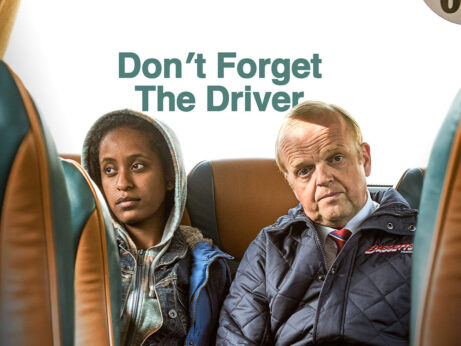
Don’t Forget the Driver – Toby Jones as a set-upon bus driver in a languishing seaside British town, given new life through his encounter with the hopefulness of an African female teen, an illegal stowaway on his bus. Jones is a master at understatement and his frustrated takes as he deals with a deteriorating working-class lifestyle in post-Thatcher Britain make him the poor man’s Bob Newhart.
RT – Three shows highlight the Russian network’s position as clearing house for left and progressive reporting and commentary: Redacted Tonight with Lee Camp as wry commentator on weekly events, Renegade Inc. with filmmaker Ross Ashcroft interviewing a different iconoclastic thinker each episode, and the old reliable George Galloway reimagined as left-wing shock jock in The Mother of All Talk Shows.
Five worst series
Hunters – Reducing the Holocaust to a Superhero cartoon is trivializing enough but then to add Al Pacino’s over-bloated Dr. X in, as usual, a hammy star turn put this Amazon series over the top, that is, beyond redemption.
The Stranger – Harlen Corben Netflix nonsense which teases as being a critique of bourgeois false morality and then at the last moment, oh so predictably, seals back up the nuclear family tensions it initially purported to expose.
#blackAF – Kenya (Black-ish) Barris’s transmuting of Black radical experience into a Curb Your Enthusiasm-type curmudgeonly grumbling. The street argot meaning of the title, black as f**k, is instead here simply an excuse to wallow in Black affluence, the real meaning of the series.
Wild District – Netflix series from Colombia that features a racist depiction of Bogotá’s inner city as a jungle and rationalizes the right-wing refusal to negotiate peace as a valiant fight against guerrilla “terrorists,” who themselves are suing to be recognized as a political party and legitimately debate ideas the right is terrifying of acknowledging.
Brockmire – Season four of this decently interesting series about an alcoholic baseball announcer and his struggle to show up for his team owner girlfriend and the boy he has tacitly adopted abandons both characters and instead opts for the entirely implausible promotion of Brockmire to be commissioner of baseball. Unlike other shows, such as Weeds, where “blowing up the series” gives it new life, this explosion demolished the series and illustrated the perennial problem with bringing back, because commercially profitable, shows which have reached their narrative peak










